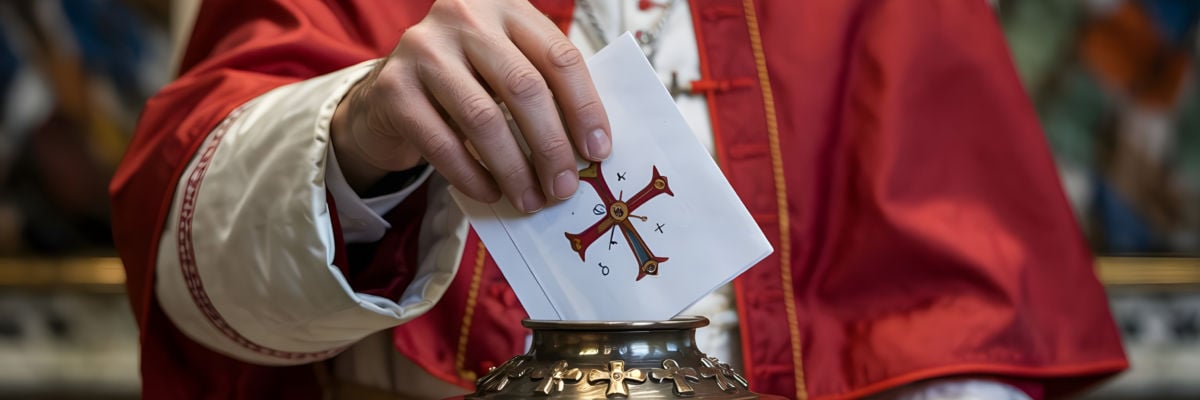
In this episode, Cy Kellett sits down with Tim Staples to explore the fascinating and lesser-known history of papal elections—before locked rooms, white smoke, and the College of Cardinals. Who chose the pope in the early Church? What led to the creation of the conclave? And how has the process evolved over 2,000 years?
Transcript:
Caller: If you could kind of give me a brief history of how the Church elected popes from the earliest centuries to the development of the current conclave. Because I’ve been asked about this quite a bit recently, and I’m always dumbfounded about how to answer it, because it’s not something I’m asked a whole lot.
Tim: Sure. Very cool. Yeah. It always comes up, you know, around the time of a conclave. Well, basically from their earliest days, it was simply the Roman clergy and the people of Rome who elected their bishop. And so it would be the Roman clergy, of course, and the people very early on would have a say as well, but ultimately it would be the Roman clergyman and such.
As time went on, you would have multiple bishops involved as well. As the Church in Rome grew, you would have more than one bishop there as well. So in order, obviously, in order to ordain a bishop, you have to have a bishop even from day one. But just a thumbnail sketch here, it was a combination of the Roman clergy and the people.
But you would also have, because of the role of the Church of Rome, you would have influential bishops, patriarchs, even from other areas that would be involved as well because of the importance of the election of the Bishop of Rome. But it was from the very earliest days, very much a local event, even though it had universal implications. And that would basically continue.
But with the advent of Christendom, once Constantine comes on the scene and the Church grows, of course, through the tribulation of the first 300 years, the Church grew enormously, and the Church of Rome, being the central Church, grew enormously. And like I said, you had multiple bishops involved in administrating the diocese because it was so large and influential.
And then once the Emperor comes on board, you had the perennial problem of emperors interfering with elections. And that would be the spearhead that would sort of… You know, I’m just thinking about this, Cy. This is not unlike how all doctrine develops in the Church.
You know, in the early first century, first 200 years, you didn’t have Trinitarian theology per se. Even the term Trinity would first be used by Saint Theophilus of Antioch. Remember, we looked that one up a few weeks ago because I couldn’t remember. Saint Theophilus of Antioch in 181 AD was the first, at least on record, of writing the term Trinity, even though the fact that the Father’s God, the Son’s God, the Holy Spirit’s God, is clearly taught in St. Ignatius of Antioch, St. Justin Martyr, St. Irenaeus, really good in St. Irenaeus and such.
But it would be the divisions that come in and the heresies that would kind of move the Church to clarify. And then, of course, exercising the authority of the magisterium would bring about the clarified doctrine of the Trinity that all Christians believe today.
Well, similarly here, when it comes to papal elections, what started on that local level, with some influence from outside, as I said, became much more of that. Because once the emperors and then the kings, Christian kings got involved and were sometimes trying to usurp authority, there was a battle going back and forth, and that’s what would lead to the development of the electors that we know as cardinals.
And the creation of the College of Cardinals didn’t happen until 1059, but it wasn’t like the creation happened immediately right there. There was already a movement in the Church of, you know, certain men who were close to the Holy Father that had authority. These guys were the ones. And of course, the patriarchs and the bishops of what we would call large metropolitans today who had influence.
And really, the College of Cardinals really just kind of grew out of necessity. And so when the College of Cardinals was created in 1059 by a papal bull, this really clarified things for the world that the pope would elect, and the pope alone could elect cardinals and establish the rules.
Now, it had already all the way back to the Book of Acts. In Acts Chapter one, of course, by divine authority, it was Peter who had the authority, for example, and Peter alone to determine how Matthias would be chosen as the successor or replacement for Judas. If you notice, in Acts Chapter one, it was Peter who laid out the rules. He quotes, you know, Psalm 69 and Psalm 109, lays out those texts that say, hey, this was prophesied to happen. Judas is no longer. He established the rules, how the election would happen.
And it happened. And they chose Matthias by lot. The pope made the rules, and back then it was by lot, which kind of seems weird. You’re going to roll the dice. Well, that was the belief back then. Of course, it was done in the Old Testament. The idea was you give it into the hands of God and God moves those lots.
But over time, it would be the bishops of Rome who would continue to make the rules. But generally speaking, again, it was done the way that bishops were elected all around the world. But once you had the creation of the cardinals, there would be developments over the centuries.
In the 13th century is when you really had the development concerning the conclave, conclave being a Latin term, which means “with key,” where these cardinals would be, you know, age, rules and all of that would really start to be developed, much like we have it today in the 13th century and down the centuries it would go.
But a key point is only the popes have the authority to change those rules, as Pope St. John Paul the Great did not too many years ago.
Ryan, thank you. Right back with more Ask Me Anything with Tim Staples on Catholic Answers Live.



